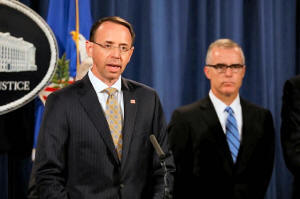|
U.S. Justice Department not looking to
charge journalists for leaks: official
 Send a link to a friend
Send a link to a friend
 [August 07, 2017]
By Pete Schroeder [August 07, 2017]
By Pete Schroeder
WASHINGTON (Reuters) - One of the top
officials at the U.S. Justice Department said Sunday that the agency's
heightened focus on policing leaks of classified information is not
intended to put journalists in legal jeopardy.
Deputy Attorney General Rod Rosenstein emphasized that the department's
renewed effort to prosecute leaks of classified information is not aimed
at the news media.
"We're after the leakers, not the journalists," he said on "Fox News
Sunday." "We don't prosecute journalists for doing their jobs."
But Rosenstein would not rule out potentially charging journalists in
the future altogether, saying reporters could face charges if they
deliberately violated the law.

"Generally speaking, reporters who publish information are not
committing a crime, but there might be a circumstance in which they do,"
he said. "I wouldn't rule it out if there were a case where the reporter
was purposefully violating the law."
[to top of second column] |

Deputy Attorney General Rod Rosenstein speaks during a news
conference announcing the takedown of the dark web marketplace
AlphaBay, at the Justice Department in Washington, U.S., July 20,
2017. REUTERS/Aaron P. Bernstein

On Friday, Attorney General Jeff Sessions announced that his department
was tripling the number of investigations into leaks of classified
information. President Donald Trump has been fiercely critical of the
high number of leaks coming from the federal government since he took
office.
Rosenstein said the Justice Department has experienced a "surge" of
referrals pertaining to leaks of government information. He also
said that the department would pursue charges against "anybody who
breaks the law" leaking information, including members of Congress
and top White House officials.
(Reporting by Pete Schroeder; Editing by Lisa Shumaker)
[© 2017 Thomson Reuters. All rights
reserved.]
Copyright 2017 Reuters. All rights reserved. This material may not be published,
broadcast, rewritten or redistributed. |